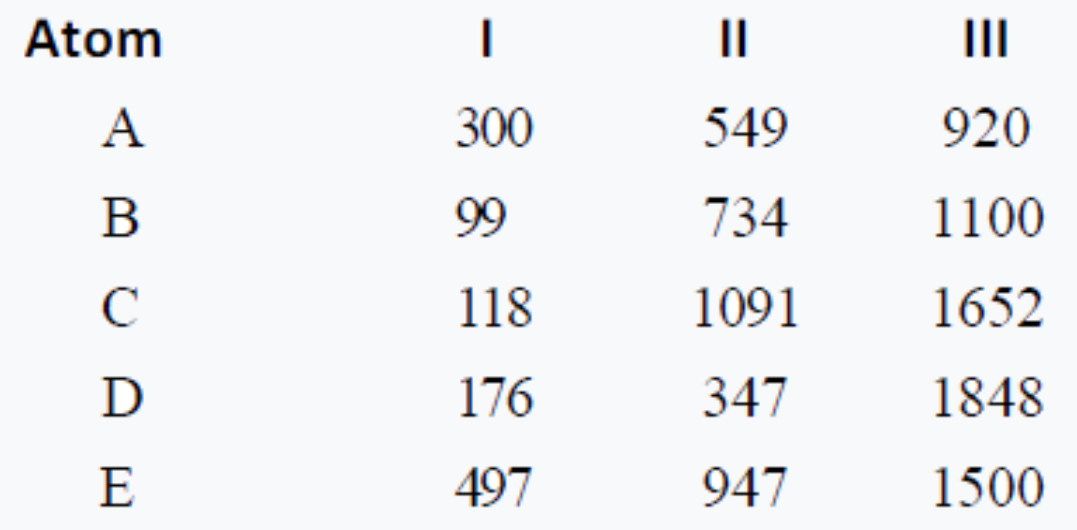Which element cannot form a cation ?
Al
B
Cs
Bi
The correct Answer is:B
To determine which element cannot form a cation, we need to analyze the electronic configurations and properties of the given elements. Let's go through each option step by step.
Step 1: Analyze Aluminium
- Atomic Number: 13
- Electronic Configuration: 1s² 2s² 2p⁶ 3s² 3p¹
- Cation Formation: Aluminium can lose three electrons (two from the 3s subshell and one from the 3p subshell) to form a cation with a +3 charge (Al³⁺).
Step 2: Analyze Boron
- Atomic Number: 5
- Electronic Configuration: 1s² 2s² 2p¹
- Cation Formation: Boron has a high ionization energy due to its small size and high effective nuclear charge. It is difficult for boron to lose its three valence electrons to form a cation. Therefore, boron does not typically form a cation.
Step 3: Analyze Cesium
- Atomic Number: 55
- Electronic Configuration: (Xe) 6s¹
- Cation Formation: Cesium is an alkali metal and can easily lose one electron from its 6s subshell to form a cation with a +1 charge (Cs⁺).
Step 4: Analyze Bismuth
- Atomic Number: 83
- Electronic Configuration: (Xe) 4f¹⁴ 5d¹⁰ 6s² 6p³
- Cation Formation: Bismuth can lose electrons from both the 6s and 6p subshells to form cations, including a +5 charge (Bi⁵⁺).
Conclusion
After analyzing all four elements, we find that boron is the only element that cannot form a cation due to its high ionization energy and small atomic size.
Final Answer: Boron (Option 2) cannot form a cation.
---
- Atomic Number: 13
- Electronic Configuration: 1s² 2s² 2p⁶ 3s² 3p¹
- Cation Formation: Aluminium can lose three electrons (two from the 3s subshell and one from the 3p subshell) to form a cation with a +3 charge (Al³⁺).
- Atomic Number: 5
- Electronic Configuration: 1s² 2s² 2p¹
- Cation Formation: Boron has a high ionization energy due to its small size and high effective nuclear charge. It is difficult for boron to lose its three valence electrons to form a cation. Therefore, boron does not typically form a cation.
- Atomic Number: 55
- Electronic Configuration: (Xe) 6s¹
- Cation Formation: Cesium is an alkali metal and can easily lose one electron from its 6s subshell to form a cation with a +1 charge (Cs⁺).
- Atomic Number: 83
- Electronic Configuration: (Xe) 4f¹⁴ 5d¹⁰ 6s² 6p³
- Cation Formation: Bismuth can lose electrons from both the 6s and 6p subshells to form cations, including a +5 charge (Bi⁵⁺).
After analyzing all four elements, we find that boron is the only element that cannot form a cation due to its high ionization energy and small atomic size.
Similar Questions
Which pair of elements can form an alloy
View SolutionWhich element cannot be detected by Lassaigne's test?
View SolutionWhich element does not form hydride upon heating with hydrogen?
View SolutionWhich of the following element do not form carbide ?
View SolutionWhich element of group 13 forms acidic oxide ?
View SolutionWhich of the following cannot form an amphoteric oxide ?
View SolutionIonization energies of five elements in kcal/mol are given below:

Q. Which element form stable unipositve ion?
View SolutionIonization energies of five elements in kcal/mol are given below:
 .
.
Which element forms stable unipositive ion ?
View SolutionIonization energies of five elements in kcal/mol are given below:

Q. Which element form stable unipositve ion?
View SolutionName a non-metallic element which forms an acidic and a neutral oxide.
View Solution
